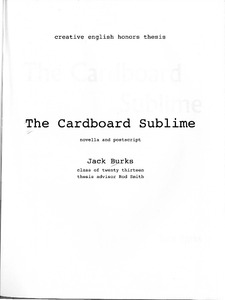| dc.description.abstract | Aristotle claimed that the purpose of art is to delight and to instruct. In dealing with the latter, it is necessary to consider the virtues advocated by a work of literature. At first glance of the opening chapters, it may appear that the moral compass of The Cardboard Sublime is the perspective granted by counterculture. But that idea is challenged by Theo's memories with Jonas, and by the ambivalence of the focal characters. Jonas's perspective first appeared to Theo as a kind of secret truth. 45 But when Jonas was proven to be schizophrenic, Theo had to look back on his past of self-creation, and consider that those methods were in fact self-destructive. There are three aspects of the novella's moral center. The first is empathy. It is proven in the end that despite their vices, Theo and his crew are willing to make sacrifices for one another. Theo also discovers sincere compassion in his past friendship with Jonas. This grants a meaning to the relationship that is untainted by Jonas's madness. The second moral aspect is ingenuity. The theme of combining broken parts to form a functioning whole, be they pieces of machinery or an identity, runs throughout the novella. Theo is a mechanic, Tobias is an engineer, Jeremy uses jerry-rigged vintage filming equipment. Besides the physical aspect, ingenuity also implies the importance of emotional, psychological, and empathetic "repair." The skill with the greatest value in the world of The Cardboard Sublime is the ability to make something useful, precious, and meaningful out of the incomprehensible multitude. It is by no means a religious story, but The Cardboard Sublime contains mystical expressions that offer the possibility of transcendental ascent. The mysticism that frames the story allows for the existence of something akin to an oversoul (which has been imitated and disrupted by the grid). The third aspect of virtue in this story is faith, no matter how irrational, in the empathetic web. Jonas would be the first to say, there are more things in heaven and earth than are dreamt of in the most bizarre philosophies. When Jonas was proven insane, Theo cast away that idea with all the rest. I would like to think that by the end of the story, Theo has reclaimed that perspective. [From concluding section] | en_US |
| dc.rights | This material is made available for use in research, teaching, and private study, pursuant to U.S. Copyright law. The user assumes full responsibility for any use of the materials, including but not limited to, infringement of copyright and publication rights of reproduced materials. Any materials used should be fully credited with the source. | en_US |
